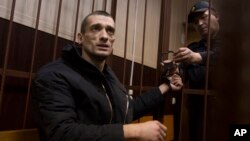The New York-based Human Rights Foundation has awarded its 2016 Vaclav Havel Prize for Creative Dissent to an Iranian cartoonist, a Russian performance artist and an Uzbek photojournalist.
"The prize celebrates those who, with bravery and ingenuity, unmask the lie of dictatorship by living the truth," the foundation said in a release Thursday.
The committee described Atena Farghadani as "a prisoner of conscience of the Iranian regime." Farghadani was sentenced to 12 years in prison for a cartoon she posted on social media depicting parliamentarians with animal heads to criticize a draft law restricting contraception and criminalizing voluntary sterilization.
The second laureate, Petr Pavlensky, is a Russian artist best known for a series of performances in which he used self-mutilation to protest the government's political crackdown. He is facing up to three years in jail for setting fire to the main entrance to the headquarters of the FSB security service in a performance meant to draw attention to what he called the terror tactics used by the agency.
"A lone artist standing up against the most powerful institution of Vladimir Putin's Russia is an important symbol — both politically and artistically," said HRF Chairman Garry Kasparov.
The third laureate is Umida Akhmedova, a Uzbekistan photojournalist and the country's first female documentary filmmaker. She has been accused of slander and "damaging the country's image" for publishing a series of photos about life in rural parts of Uzbekistan.
"Despite the government's attempts to manufacture a polished, happy image of the country, she exposes the reality of life in one of the world's most closed societies," said John Egenaes, secretary general of Amnesty International Norway.
The three laureates will be honored at a ceremony during the Oslo Freedom Forum this month. They will also share a $43,000 prize.
The prize is named in honor of Vaclav Havel, the dissident Czech poet, playwright and statesman whose activism against oppression and on behalf of human rights and democracy helped topple communism in the former Czechoslovakia.






